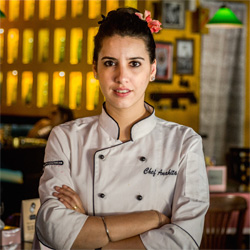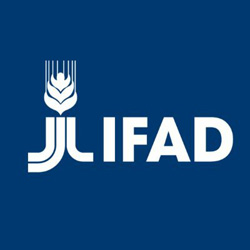What it means to make “good” food: A conversation with Chef Dhondy
IFAD Asset Request Portlet
ناشر الأصول
What it means to make “good” food: A conversation with Chef Dhondy
من Anahita Dhondy, IFAD
Chef Anahita Dhondy is a passionate advocate for Parsi food – the rich cuisine of India’s Zoroastrian community to which she belongs. Parsi cuisine is built on local, seasonal, sustainable ingredients, including an abundance of nutritious grains native to India that have been largely forgotten in recent decades.
From her first restaurant, SodaBottleOpenerWala, to her media appearances and social media platforms, Chef Dhondy’s work is dedicated to reviving lost recipes, bringing Parsi cuisine to new audiences, and promoting sustainable food practices.
We recently spoke with her on the occasion of her joining our Recipes for Change campaign. Our conversation has been lightly edited for clarity and length.
IFAD: Your new book, Parsi Kitchen, is about embracing the cuisine that you were immersed in daily growing up. Can you tell us about your Parsi heritage and why you chose to make it your focus in the kitchen?
Chef Dhondy:
I grew up in New Delhi, India, and the Parsi community there is very, very small. Over all, the Zoroastrian community is very small and tight-knit.
When I was in culinary school, I always felt that there wasn’t a representation of our cuisine. So, I decided to take it upon myself to showcase that in every way possible: through my first restaurant, SodaBottleOpenerWala; through my book; and through my social media. I’m hoping to make sure that the story and the ingredients and the recipes of Parsi cuisine are heard by all and inculcated in daily life.
IFAD: There’s a strong theme of representation throughout your work, too. On that note: in your experience, what struggles do women chefs in this industry face?
Chef Dhondy:
I’ve been getting asked this question since back when I was in culinary school, and I’ve always responded the same. A chef is a professional, like a doctor or engineer or teacher. You’re not going to call them a female teacher or female doctor; you’re just going to address them with their professional name. I think it’s extremely important to reinforce that basis, that there is no difference between a man and a woman in the kitchen because our responsibilities are exactly the same.
Yes, there isn’t enough representation, and that’s because of the cultures that we come from, where people think that kitchens are not great environments for women to be working in. But we’ve seen how kitchens have evolved over the past 20 years and we’ve seen how more and more women are joining kitchens. And as more women climb the ranks, more will be encouraged to try.
IFAD: You’ve become known as a proponent of traditional cereals such as sorghum and millet. So why are certain grains encouraged on a large scale, while others are neglected and lost?
Chef Dhondy:
During the Green Revolution, there were certain crops that were prioritized and grown as cash crops, especially in India, where the market was pushed to promote rice and wheat. And millets, which are ancient indigenous grains from India, were completely lost in the process. Farmers weren’t getting the right prices for them, nor was the market demanding for these grains.
Just to give everyone a bit of context, millets are very small grains with high nutritional density and great protein content. There is one particular type of millet known as finger millet, which in Hindi we call ragi. It’s gluten-free and has three times the amount of calcium that milk has.
But all of this got lost and we stopped eating this grain. So over the past 10 years, I’ve been trying to bring back these millets and make them cool again. The goal is to have customers try it and like it in a restaurant, then go back home and cook it there. That creates this cycle of demand that will hopefully help farmers start growing it again. And I’m happy to report that there has been a growth in interest and a lot of people do want to try these grains and bring them back onto their tables.
IFAD: What role do chefs play in creating a more sustainable future of food?
Chef Dhondy:
I think the traditional role of chef has always been seen as someone who’s managing the kitchen and their team, someone who is always behind the scenes and never really in the front of the house. But what I always tell younger chefs that are just entering the industry is that there’s actually a huge amount of diverse work that a chef can do.
Today, we have a greater responsibility, and that is to be the connection between the farmer and the consumer. The farmer is the one that gives us the food we take into the kitchen and make dishes out of, and the consumer is the one that appreciates it. As a chef, you need to analyse how you are using your skills and your voice to create something that is not just “good” – as in, looks good or tastes good – but that is also good for people and the planet.
IFAD: Why did you join Recipes for Change?
Chef Dhondy:
I’ve always aligned my work very closely with the Sustainable Development Goals and I’ve always questioned how we as chefs can do our part in eradicating hunger. I know we’re busy running restaurants, but we also have a very important social responsibility. That’s something we need to take time out for. Creating awareness is the most important thing, and that’s why I think joining Recipes for Change can create that really important, positive social impact.
Check out all of our Recipes for Change.
تاريخ النشر: 27 يونيو 2022

